The Palestinian Arena: Preserving the Status Quo or Seeking Change?
Udi Dekel and Noa Shusterman
Snapshot
The Political, economic, and healthcare low points · Failed attempts at Fatah-Hamas reconciliation · Israel prefers the status quo and seeks a long-term ceasefire with Hamas · Palestinians anticipate improved relations with the US
The Palestinian Arena: Preserving the Status Quo or Seeking Change?
Udi Dekel and Noa Shusterman
Recommendations
Strengthen the PA as the responsible address for the Palestinians in the West Bank · Transitional arrangements toward separation · Security calm from Gaza in exchange for improvements to civilian life and infrastructure
2021 brings hope for the Palestinian political system, which sustained a series of severe blows over the past year: the “Trump plan”; the nullification of Palestinian veto power over normalization between Israel and Arab countries; the COVID-19 pandemic; economic and social crises. The Hamas leadership in the Gaza Strip has chosen to reach understandings with Israel regarding a period of temporary calm, in order to improve the humanitarian, health, and infrastructural situation. Consequently, for now, the organization is not interested in escalation and is enforcing restraint on the factions in Gaza. However, sporadic rocket fire is Hamas’s main way of challenging Israel, despite the risks of escalation. In the case of a conflict, Israel will need to inflict severe damage on Hamas’s military wing. The Biden administration is expected to exhibit less support for Israel’s positions than did its predecessor, and with the encouragement of European countries, advance the two-state solution. Israel has an interest in maintaining a stable and functioning Palestinian Authority. It should thus take a supportive approach toward it, include it in regional agreements, and define a political objective to achieve transitional arrangements toward separation (political, territorial, and demographic).
The Torments of 2020
When the normalization agreements between Israel and the United Arab Emirates and Bahrain were signed, and following the announcements on relations with Sudan and Morocco, the Palestinian system found itself at one of its starkest moments of strategic weakness. These events symbolized the loss of an important strategic asset – veto power over normalization between Israel and the Arab world – and provided further evidence of the relegation of the Palestinian issue to the sidelines of the regional and international agenda. Despite the consent reached in Istanbul (September 2020) on reconciliation between Fatah and Hamas, which was meant to redress the weakness and distress of the Palestinian system, the split between them endures, and the arena remains fragile and subject to severe health and economic crises.
Four seminal developments made 2020 an especially challenging year for the Palestinians:
- The Trump plan: In January 2020, President Trump presented the “deal of the century” – a new paradigm for resolving the Israeli-Palestinian conflict and adjusting the architecture of the Middle East, based on an Arab-American-Israeli coalition. The plan overturned the principles that have guided the political process between Israel and the Palestinians for the past three decades, including the Palestinian leadership’s belief that time works in favor of the Palestinian national project, and that eventually the international community will impose Palestinian conditions for a settlement on Israel. The plan was rejected by the Palestinian Authority and the other Palestinian currents because it essentially adopted the Israeli positions – keeping settlements in place and leaving Israel with increased security power – and offered the Palestinians authority over a limited entity. With the election of Joe Biden as President of the United States, the Trump plan has lost its direct relevance, but its implications for a new regional order remain.
- Israeli annexation intentions: With the announcement of the Trump plan, Prime Minister Benjamin Netanyahu declared that he would soon take action to apply Israeli sovereignty to territories in the West Bank (annexation) in accordance with the Trump plan (up to 30 percent of the West Bank). The Palestinian leadership responded with the limited means available to it – suspending the security and civilian coordination and agreements with Israel, and refusing to accept the money from taxes collected by Israel. In addition, there were efforts toward intra-Palestinian unity and reconciliation between Fatah and Hamas. It became clear to the respective leaderships in the West Bank and the Gaza Strip that there is little response from the Palestinian public to calls for a popular struggle. Israel suspended the annexation for an undefined period in return for the normalization agreement with the United Arab Emirates.
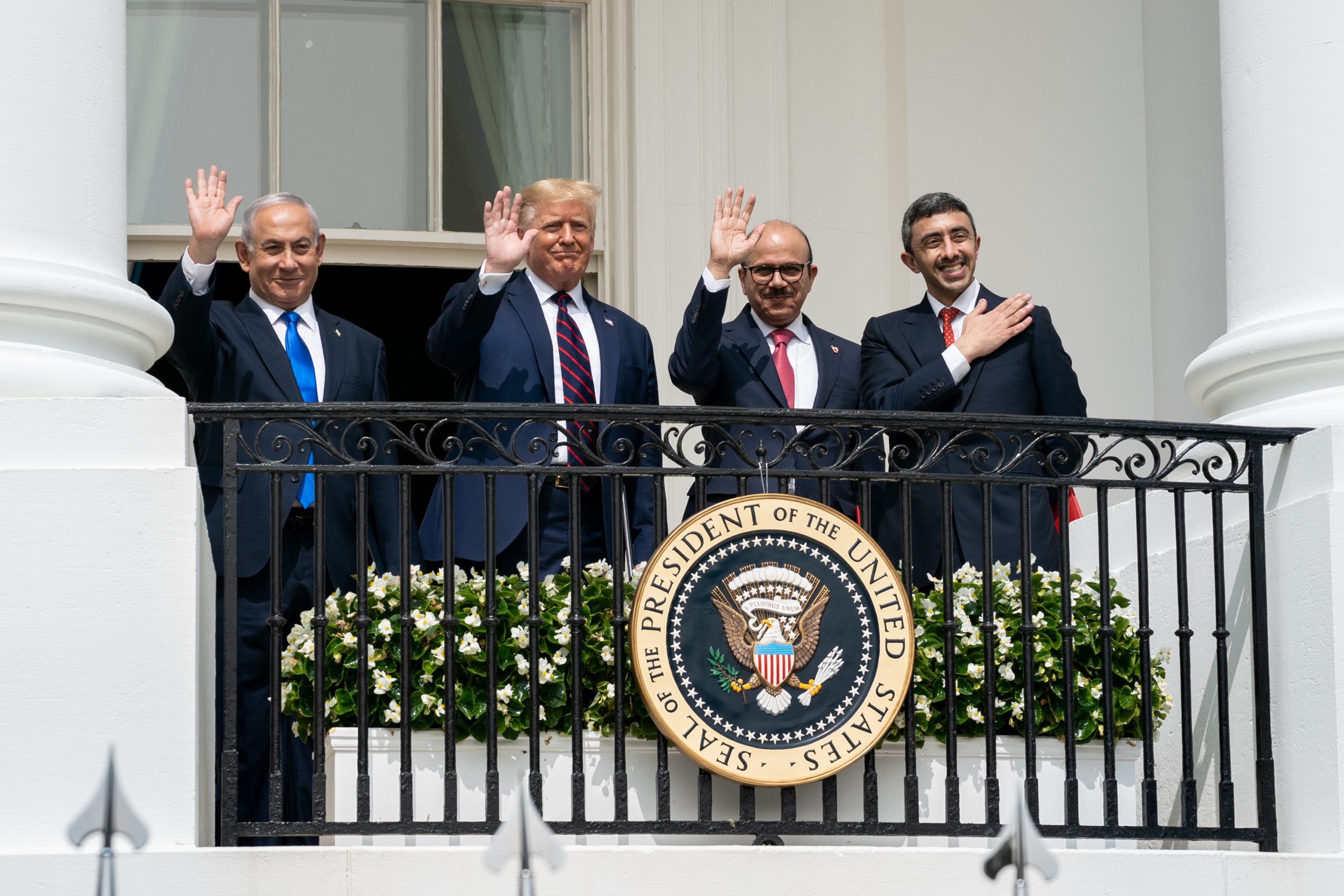
The most severe blow to the Palestinians. Signing the Abraham Accords at the White House
Photo: The White House
- Normalization: The announcements by the United Arab Emirates, Bahrain, Sudan, and Morocco on establishing official relations with Israel were the most severe blow, as they demonstrated that a comprehensive agreement on establishing a Palestinian state based on the 1967 borders with its capital in East Jerusalem, with a right of return for refugees, is no longer a precondition for the normalization of relations between Arab countries and Israel. The normalization agreements clearly symbolized the erosion of the Palestinian issue and showed that individual interests of Arab countries override the Palestinian interest. The PA’s attempt to pass a condemnation of the normalization trend at the Arab League also failed. The Palestinian response to the normalization trend began with a public bang and ended with a feeble whimper.
- Health and economic crises: The economic crisis in the Palestinian Authority and the serious humanitarian situation in the Gaza Strip worsened due to the spread of COVID-19, which intensified in late 2020; the severed coordination with Israel for half a year; and a decline in monetary assistance from Arab countries.
Trends for 2021
Mahmoud Abbas and the Palestinian Authority leadership were hard-pressed to cope with the decided pro-Israel policy of the Trump administration, and Biden’s election signals what they anticipate will be a new, more favorable direction from the United States. It also boosts their hope that the change in administration will shelve Trump’s plan and steer the political process back to the Palestinians’ preferred path – based on an international framework and decisions that do not force them to be significantly more flexible regarding the resolution of the Israeli-Palestinian conflict.
The suspension of the application of sovereignty by the Israeli government for an undefined period of time was accompanied by reversion to the policy of practical creeping annexation and the expansion of construction in all the West Bank settlements, including those east of the security barrier, without a future vision for separation. The Israeli government sees no reason to advance a political process with the Palestinians, as it believes that the current situation is preferable to other alternatives – certainly now that it has breached the barrier of establishing normal relations with the Arab world. Right wing figures believe that time is working in Israel’s favor, and therefore the risk inherent in the two-state solution is receding. Even if Israel answers the call to return to the negotiating table, it is expected to demand that the Trump plan serve as a basis, or at least a point of reference, for negotiations – a demand that the Palestinians will refuse to accept.
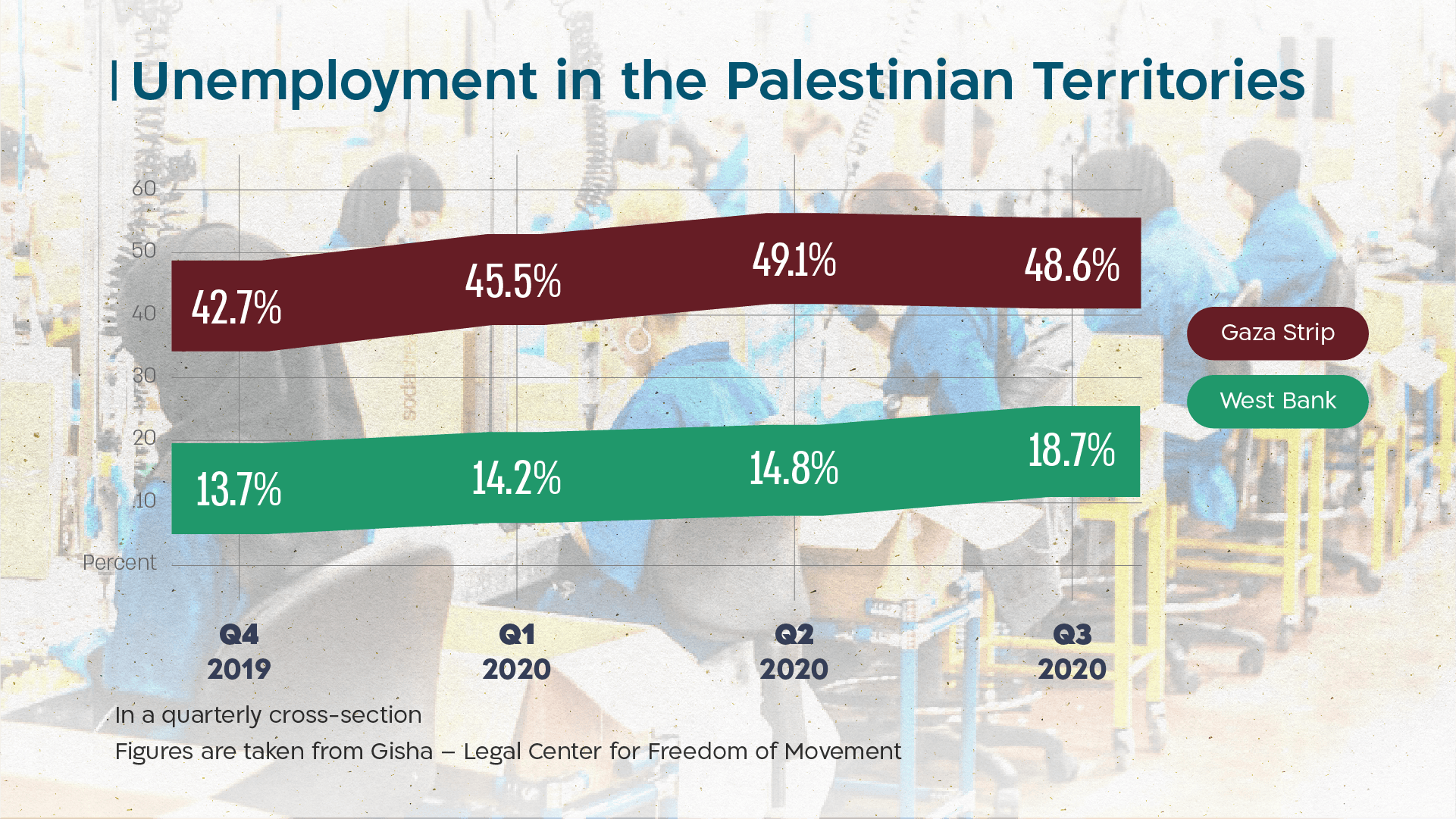
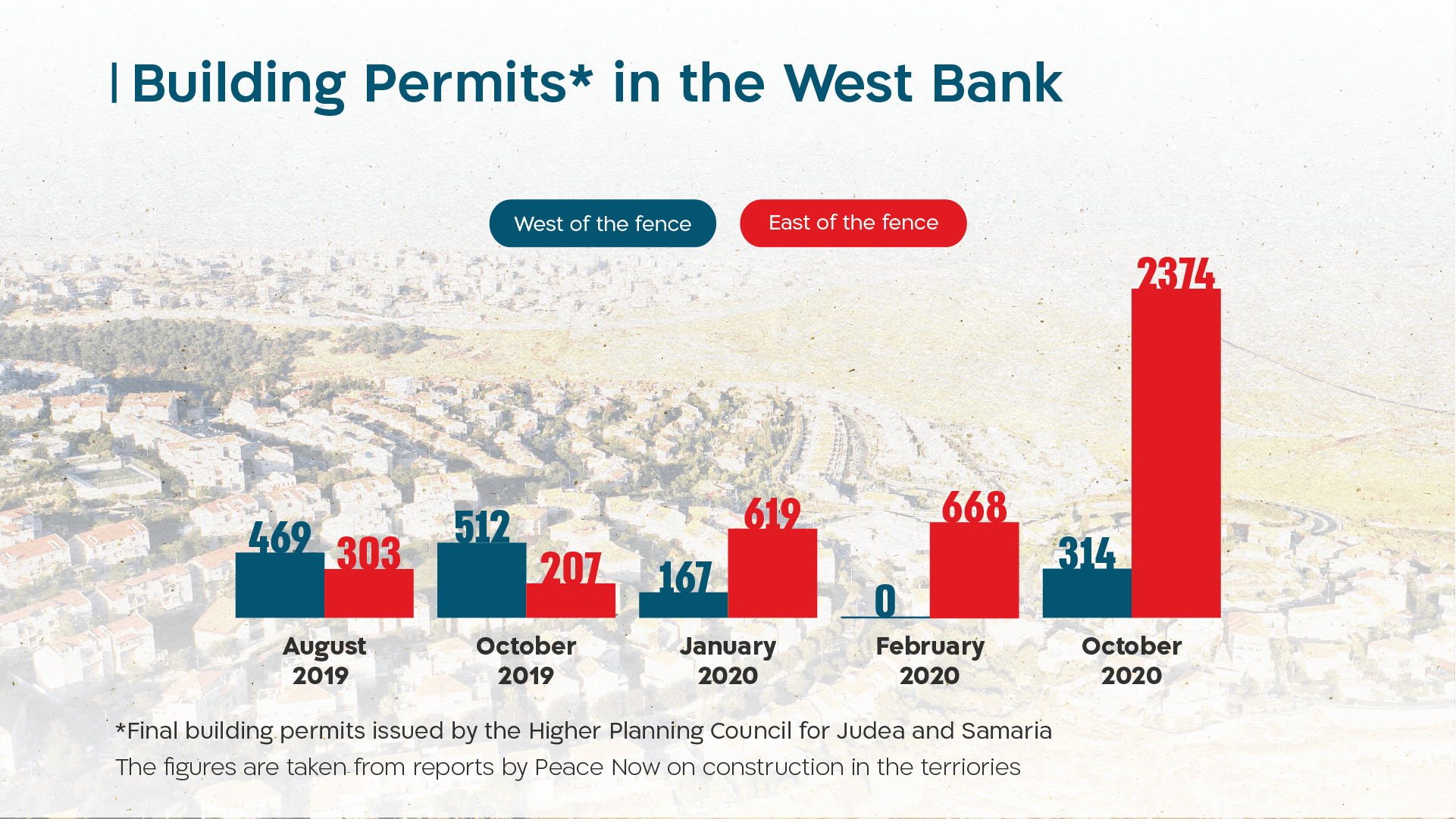
“Sumud” – steadfastness – is the principal bastion of the Fatah and Hamas leaderships. As with any crisis in the Palestinian camp, three operational possibilities return to the agenda: intra-Palestinian reconciliation; the threat to dissolve the Palestinian Authority and “return the keys” to Israel; and escalation. But in practice, the leaderships of both Fatah and Hamas wish to preserve their historic achievements, and the implementation of these alternatives is unlikely: the Fatah leadership will not relinquish its senior status within the PLO, the Palestinian Authority, and the institutions of the state-in-the-making, and Hamas will not relinquish its control of the Gaza Strip. The increase in support for violence toward Israel among the Palestinian public, according to Palestinian Center for Policy and Survey Research (PCPSR) polls, has not in practice influenced terrorist activity on the ground, and in this respect a low level of activity in the West Bank has been maintained, despite the halted security coordination with the IDF. In the Gaza Strip there has been a significant decline in incidents near the border fence and rocket fire, and the flow of money from Qatar continues.
The Palestinian issue is expected to remain a low priority on the agenda of the Arab world, while immediate interests, first and foremost the struggle against Iran and containment of Turkey’s expanded influence, override commitment to the Palestinian cause and instead spur efforts to establish a new regional coalition that includes Israel. Biden’s election, which in the eyes of Sunni world leaders indicates a return to the policy of the Obama administration, with a conciliatory approach toward Iran in comparison with that taken by President Trump, could actually strengthen the emerging coalition against the Iranian-Shiite axis, and thus also consolidate Israel’s standing as a senior member of the evolving regional system. While Turkey and Qatar seek to exploit the weakness of the Palestinian system in order to expand their influence over it, it is unlikely that the PA leadership will join them, which are identified with the Muslim Brotherhood, especially given the possibility that the Biden administration will display renewed openness toward the Palestinians. The Hamas leadership in Gaza also evidently understands that alignment with Turkish-Qatari camp is problematic, due to its rivalry with Egypt, which controls Gaza’s lifeline – the Rafah crossing.

Significant drop in the number in the number of incidents in the border fence area and in rocket fire. A demonstration in the Gaza Strip
Agents of Change
Theoretical intra-Palestinian reconciliation: Abbas’s willingness to enter unity discussions with Hamas acknowledges that in order to restore the Palestinian issue to the center of regional and international interests, and thus also to challenge Israel, the organizations need to come to some arrangement between them. However, advancing this process incurs a risk for Abbas and Fatah, because its success would serve as a springboard for Hamas’s integration within the Palestinian Authority and the PLO, and advance its drive to take over these bodies. For Abbas, a new US administration is an opportunity to return his agenda to forefront, which mitigates his desire to advance reconciliation and elections. If it becomes clear that the Biden administration does not place a high priority on advancing a settlement between Israel and the Palestinians, and the Palestinian issue remains on the sidelines, the intra-Palestinian reconciliation efforts will resume. According to PCPSR polls, over 50 percent of Palestinians see the rift as the reason for the displacement of the Palestinian cause from the regional stage, but the majority of the Palestinian public does not believe that the reconciliation efforts will succeed. In addition, over 60 percent believe that the two-state solution is no longer viable.
The economic crisis and the COVID-19 outbreak in the Gaza Strip have forced Hamas to prioritize reaching understandings with Israel, in order to improve the bleak humanitarian and infrastructural situation in the territory. Within the ranks of the movement, the process of leadership elections has begun; once it ends – expected in the spring of 2021 – it will influence the understandings approach adopted by the Hamas leader in Gaza, Yahya Sinwar. At the same time, Hamas will continue to build its military power, and in particular, increase its stockpile and range of rockets and unmanned attack aircraft. From time to time Hamas enables rogue factions to launch an attack from the Gaza Strip toward Israel – reminding both Israel and its population that the military challenges are still in force – but it evidently prefers to avoid escalation.
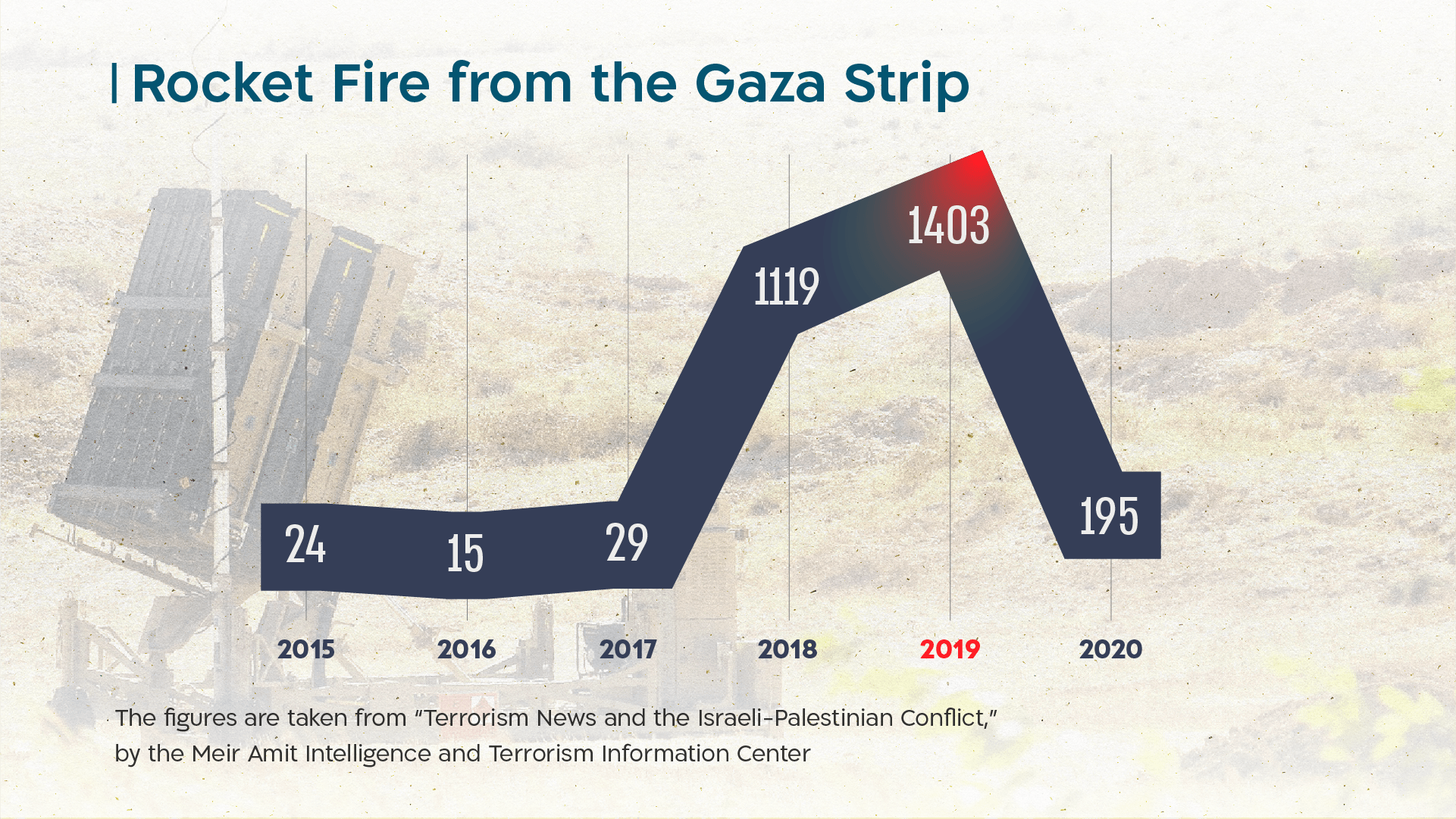
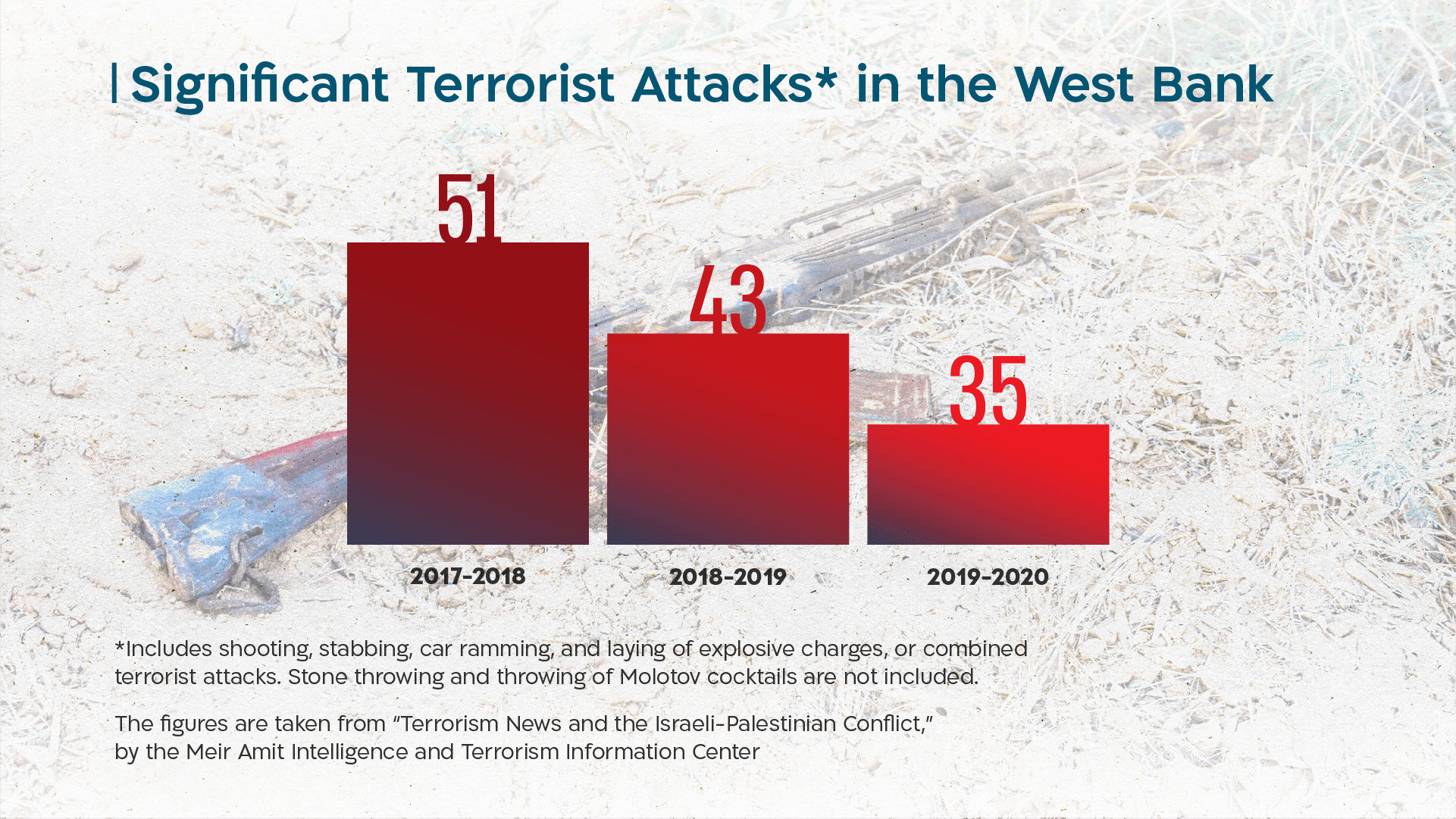
Under Biden, the Democratic administration is expected to moderate the intensity of the US support for Israel in comparison to the Trump administration, and the European countries will likely try to convince it to revive the political process. The Democratic Party supports the two-state solution, but advancing the idea is unlikely to be a top priority for the administration. Biden’s inner circle recognizes the importance of the Palestinian Authority for Israel, as it frees Israel from the direct burden of responsibility for the population in the territories. For this reason, the new administration will likely seek to ensure that the PA does not collapse economically and does not lose its political relevance, and that the diplomatic relations between Washington and Ramallah are revived, including by reopening the Palestinian mission in Washington; renewing the activity of the American consulate in East Jerusalem; and restarting American security assistance – monetary and training – to the PA’s security apparatuses, while the PA and Israel resume security and civilian coordination. The PA announced that it will carry out reforms in the system of payments to terror prisoners and their families, to allow the administration to renew the economic aid, in light of the legislation in Congress against support for terrorists’ families. Presumably the Biden administration will also seek to restore the monetary support for UNRWA (some $250 million a year), and in this way indirectly ease the financial and social burden imposed on the PA. However, Israel must condition this on increasing the inspection of the organization’s activities.
The Biden administration will challenge the Israeli government regarding the strategic objective of the two-state solution, and will thus cancel the green light that the Trump administration gave to continued construction in all the settlements, the demolition of Palestinian structures in Area C, and the other gradual annexation measures that in its view block the possibility of establishing an independent Palestinian state with territorial contiguity in the West Bank – all while attempting to prevent frequent clashes with the Israeli government. The Democratic administration is not expected to cancel the recognition of Jerusalem as the capital of Israel or return the embassy to Tel Aviv. In contrast, there is a high likelihood that the new administration will cancel the recognition of the legality of the settlements, and will apparently prefer to ignore the Trump plan for a final agreement, aside from the recognition of the two-state solution and the need to advance the Palestinian economy, infrastructure, and movement and access of goods, but will support the continuation of the normalization trend.
Possible Turning Points
Abbas’s departure from the scene stands to influence the future of the PA and its governance capability. Succession struggles are expected, as are perhaps changed relations between Fatah and Hamas. Abbas’s successor or successors (if there is a joint leadership) will likely adopt a confrontational approach toward Israel, and perhaps encourage violent popular resistance. The integration of Hamas in the PA leadership would deepen the divide between Israel and the PA and make it difficult to maintain the civilian and security coordination. Under these circumstances, states that define Hamas as a terrorist organization would face a dilemma of whether to recognize the new Palestinian leadership, even though Hamas continues to reject the demands of the Quartet as a condition for dialogue – recognizing Israel, respecting agreements, and preventing terrorism and violence.
Limited rounds of escalation in the Gaza envelope could develop into a military conflict, if both Israel and Hamas feel it necessary to respond to the actions of the other side, or perhaps as a result of the severe humanitarian crisis in Gaza. In a military deterioration, Israel has two frameworks for response: a limited response – to restore deterrence and return to a period of calm; or a broad response, in order to dismantle the military wings of Hamas and Islamic Jihad, while making an effort to avoid being drawn into a prolonged presence in Gaza. A second development is the attainment of a long-term arrangement/understandings, without or after a military operation, to establish a prolonged period of calm in return for widespread easing of the closure, as well as an agreement on the exchange of the civilians and the bodies of the soldiers held by Hamas in return for the release of prisoners. A third possible development involves actions by extreme factions, especially Islamic Jihad and other rogue factions that could torpedo containment and arrangement efforts and cause a military escalation.
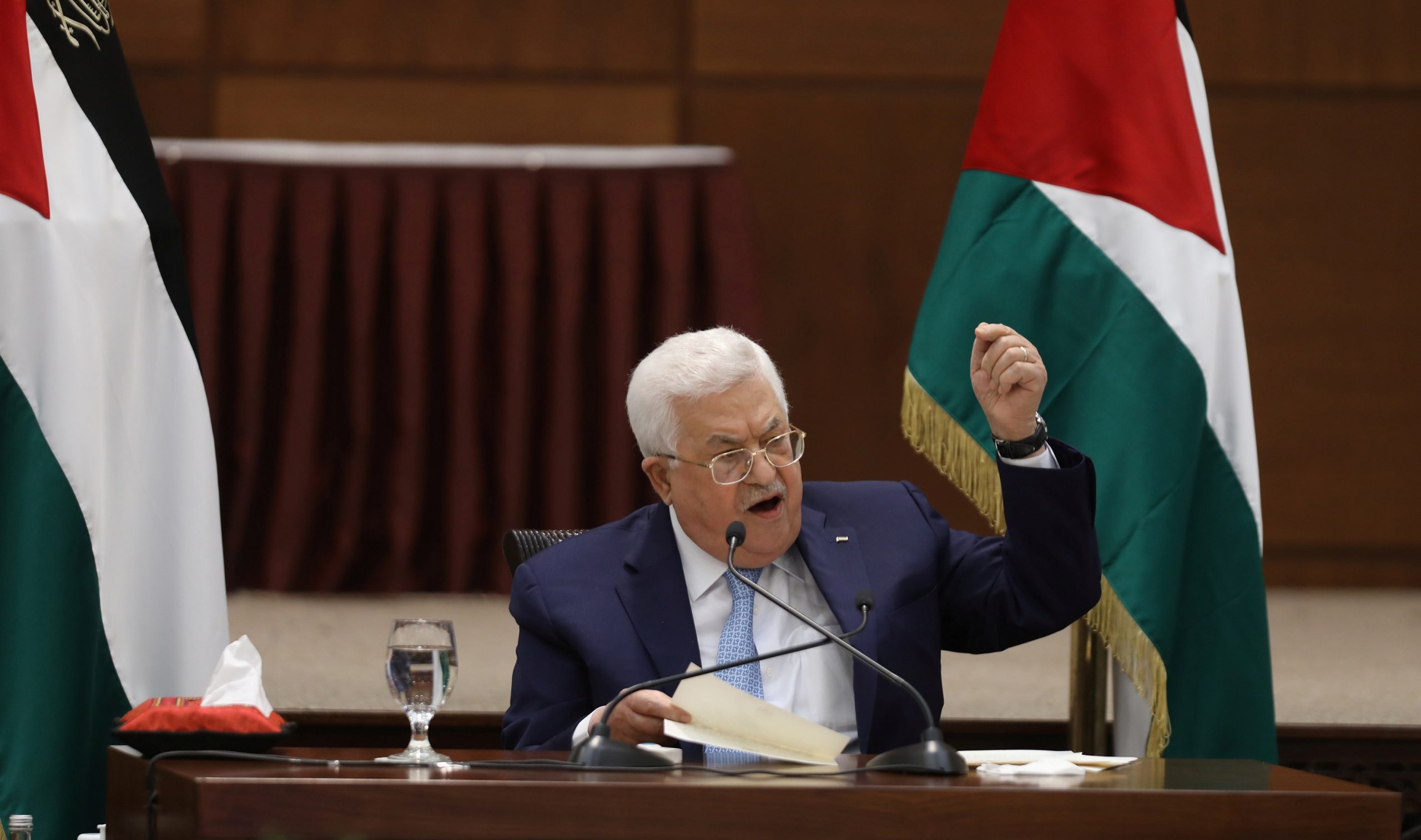
His successor may adopt a more confrontational approach toward Israel. Palestinian Authority Chairman Mahmoud Abbas
Photo: Alaa Badarneh/POOL via REUTERS
The Palestinian ability to inflict damage: In a situation of continued political deadlock and creeping Israeli annexation, and given the expansion of the normalization agreements between Israel and additional Arab countries, the Palestinian factions could come to the conviction that the only tool left in their arsenal is their ability to do damage, that is, the possibility to torpedo the normalization trend. Consequently, it is possible that they will make use of terrorism and violence with increasing intensity, in order to draw Israel into a military response that exerts pressure on the Palestinian population, which in turn would provoke harsh criticism in the Arab and international community and even stop the normalization process following domestic pressure on leaders of the pragmatic Arab countries. In addition, escalation would accelerate the prosecution proceedings against Israel in the International Criminal Court (ICC), which will apparently go into high gear in 2021.
Policy Recommendations
The Palestinian system faces significant uncertainty that is influenced by a combination of events in Israel, the region, and the world, which could spark unintended consequences. The clear trend is of the weakening of the PA and the struggles underway within its ranks behind the scenes, in advance of President Abbas’s departure from the scene. These struggles could undermine the performance of the PA and even lead to its loss of governance. The existence of a functioning, stable, and non-hostile Palestinian Authority is an essential interest for Israel, first, as the basis for a calm security situation, and second, so that the burden of responsibility for managing the lives of the Palestinians does not fall on Israel. A stable security situation is also an important component of deepening and advancing normal relations with Arab countries. Thus, Israel must adopt a supportive approach toward the Palestinian Authority and help it restore its functionality, especially with respect to the economy and healthcare (also in order to cope with the COVID-19 pandemic and its consequences). Strengthening the PA and opening up the possibility of a political process are expected to curb the burden of responsibility on Israel’s shoulders of managing the lives of the Palestinian population, and improve Israel’s relations with Jordan. Israel’s interest is in integrating the PA into economic, technological, and other agreements that will develop following normalization with the United Arab Emirates and other Arab countries, so that it benefits from the advantages of regional cooperation and normalization.
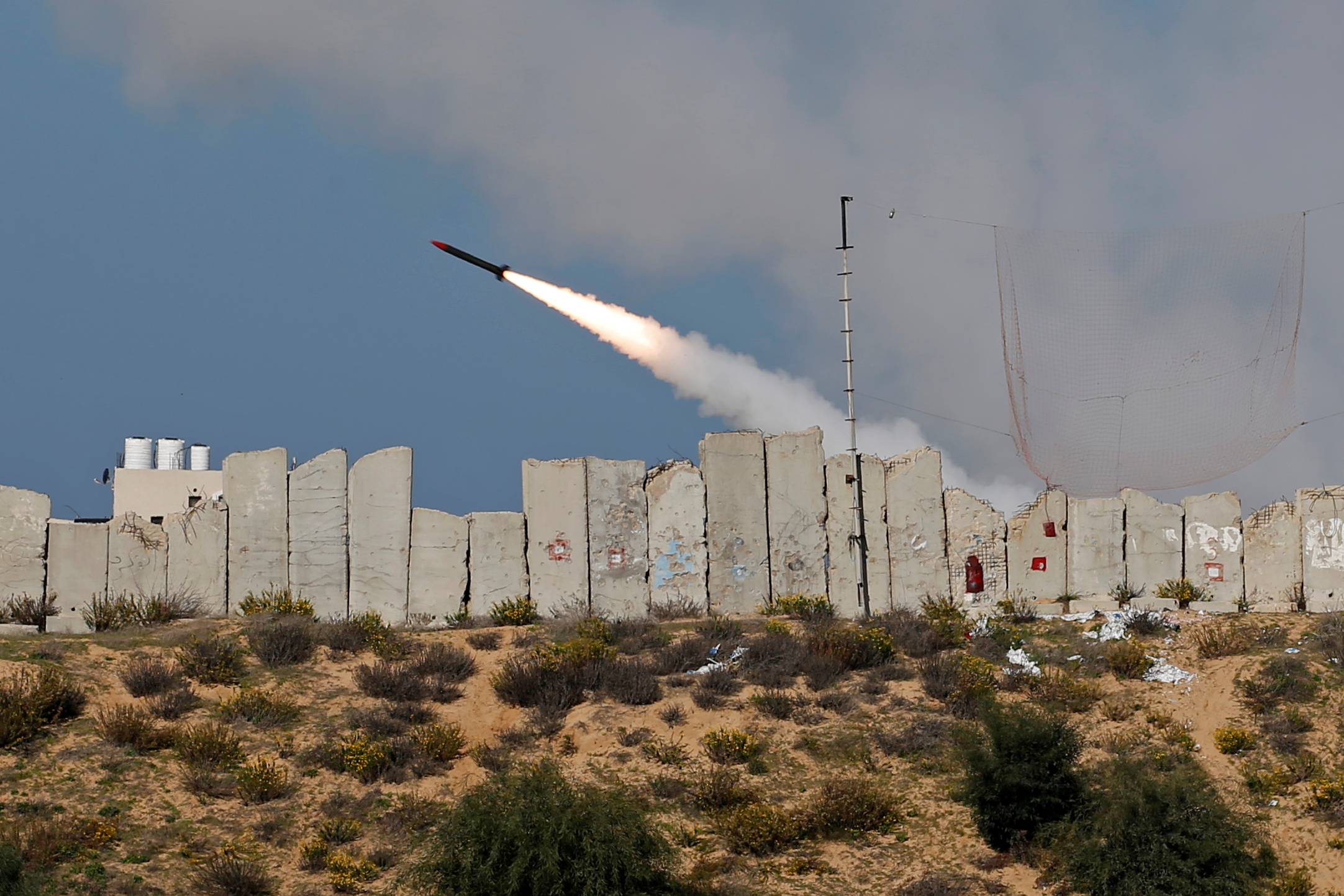
Escalation dynamics could result in a large-scale conflict. Rocket launch during a Hamas exercise in the Gaza Strip, December 2020
Photo: REUTERS / Suhaib Salem
While the Palestinians have lost their veto power over the establishment of relations between Israel and the Arab countries, and the principles dictated by the Arab Peace Initiative are seemingly no longer relevant, Israel should recognize that the Arab regimes that wish to join the normalization trend cannot afford to ignore the criticism of domestic and external opposition elements, and must demonstrate that they have not entirely abandoned the historic commitment to resolve the Palestinian issue. For this reason too, the possibility that the Biden administration will work to advance a political process with the Palestinians is in Israel’s interest. Israel will not benefit from pushing the Palestinians into a corner or from the annexation of territories east of the security barrier.
Israel must formulate a joint strategy with the Biden administration that rests on the understanding that currently the only viable option is shaping a reality of Israel’s political, geographic, and demographic separation from the Palestinian Authority, in order to maintain the feasibility of a future settlement based on two separate and distinct entities. To this end, it is necessary to reduce the investment in the settlements east of the security barrier, without affecting the military control of the Jordan Valley and the IDF’s freedom of operation throughout the West Bank.
With respect to the Gaza Strip, Israel must continue to maneuver between the need to maintain deterrence of Hamas and Islamic Jihad, in order to deny them achievements by means of force, and the need to pacify the situation in the Gaza envelope area. In order to alleviate the severe problems plaguing Gaza, Israel should, with the mediation of Egypt and the UN, advance understandings with Hamas on a prolonged period of calm. This can be achieved in return for easing the closure and significantly improving the civilian infrastructure in Gaza, with an emphasis on ensuring the regular supply of electricity and water and expansion of the population’s sources of livelihood and means of subsistence.
________
* Kobi Michael, Yohanan Tzoreff, Pnina Sharvit Baruch, and Oded Eran participated in formulating the assessment


